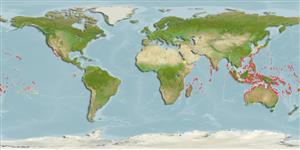>
Blenniiformes (Blennies) >
Tripterygiidae (Triplefin blennies) > Tripterygiinae
Etymology: Helcogramma: Greek, helkos, -eos, -ous = ulcer, sore + Greek, gramma = letter, mark (Ref. 45335).
More on author: Herre.
Environment: milieu / climate zone / depth range / distribution range
Sinh thái học
Biển gần đáy; Mức độ sâu 2 - 10 m (Ref. 6211), usually 2 - 5 m (Ref. 48636). Tropical
Indo-Pacific: widely distributed. The species complex is being revised by J.T. Williams.
Bộ gần gũi / Khối lượng (Trọng lượng) / Age
Maturity: Lm ? range ? - ? cm
Max length : 5.7 cm SL con đực/không giới tính; (Ref. 6211)
Các tia vây lưng cứng (tổng cộng) : 16; Các vây lưng mềm (tổng cộng) : 9 - 10; Tia cứng vây hậu môn: 1; Tia mềm vây hậu môn: 18 - 20; Động vật có xương sống: 34 - 35. Diagnosis: Dorsal fin III + XIII+ 9-10, second fin same height of first; anal fin I + 18; pectoral rays 16 (1+8+7); pelvic fin I, 2, spine short and hidden, segmented rays simple, partially united by membrane. Vertebrae 10 + 24-25. LL total lateral scales 36-38, pored series 33-37 (21) scales; nape, belly, and anal-fin base scaleless, caudal fin base with only 1 row of scales. Mandibular pores 5-7+3-5+5-7. Orbital cirrus flat and palmate. Head length 3.5 in SL; eye 2.8; maxilla 2.3 in HL. Male head dark brown on top, reddish above eye, black and blue below, with narrow stripe from maxilla to preopercle; body brownish grey with 3 pale saddles; belly pink. Female head white with red and brown spots below, shading darker and with brown blotches above, with brown stripe from upper lip to corner of eye; body white with brown oblique semi-bars and blotches on dorsal half of side (Ref. 75031). Males distinctly colored during courtship, but look drab at other times (Ref. 48636).
Adults inhabit rocky boulders from depths of 2 to 5 m, common at depths less than 10 m (Ref. 6211). They live in small groups, each comprising a male and several females (Ref. 48636) on rock surfaces and under ledges and tidepools (Ref. 75031). Eggs are hemispherical and covered with numerous sticky threads that anchor them in the algae on the nesting sites (Ref. 240). Larvae are planktonic which occur primarily in shallow, nearshore waters (Ref. 94114).
Life cycle and mating behavior
Maturities | Sự tái sinh sản | Spawnings | Egg(s) | Fecundities | Ấu trùng
Hansen, P.E.H., 1986. Revision of the tripterygiid fish genus Helcogramma, including descriptions of four new species. Bull. Mar. Sci. 38(2):313-354. (Ref. 6211)
IUCN Red List Status (Ref. 130435)
Threat to humans
Harmless
Human uses
Các công cụ
Special reports
Download XML
Các nguồn internet
Estimates based on models
Preferred temperature (Ref.
123201): 24.7 - 29.3, mean 28.3 °C (based on 3300 cells).
Phylogenetic diversity index (Ref.
82804): PD
50 = 0.5000 [Uniqueness, from 0.5 = low to 2.0 = high].
Bayesian length-weight: a=0.00562 (0.00258 - 0.01228), b=3.08 (2.89 - 3.27), in cm total length, based on LWR estimates for this (Sub)family-body shape (Ref.
93245).
Mức dinh dưỡng (Ref.
69278): 3.1 ±0.3 se; based on size and trophs of closest relatives
Thích nghi nhanh (Ref.
120179): Chiêù cao, thời gian nhân đôi của chủng quần tối thiểu là dưới 15 tháng (Preliminary K or Fecundity.).
Fishing Vulnerability (Ref.
59153): Low vulnerability (10 of 100).
